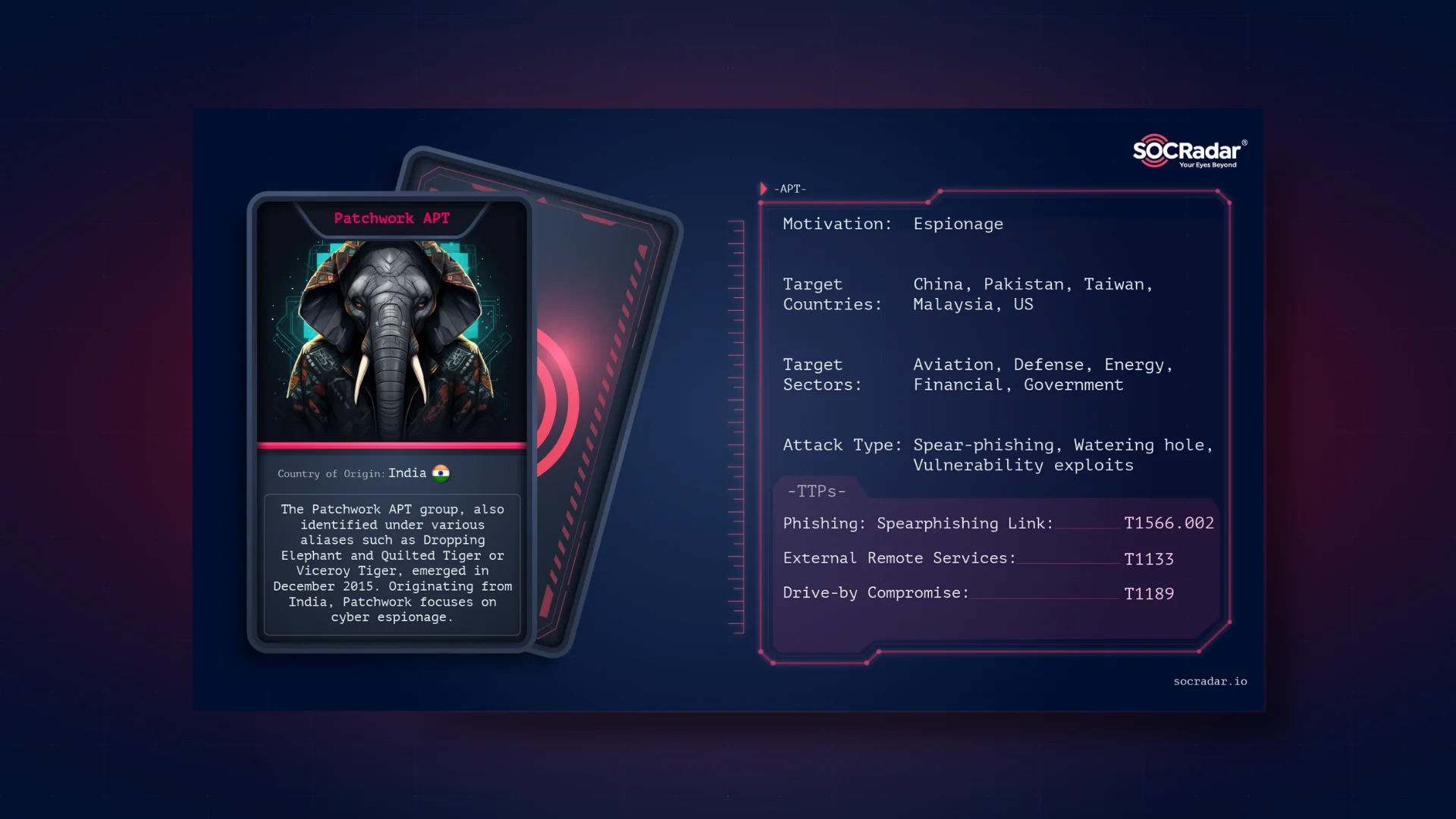
Threat intelligence enriched with External Attack Surface Management, Brand Protection, and Dark Web Radar.
Protect your business from the dangers lurking in the hidden corners of the internet.
Effective threat hunting and threat actor tracking with behavioral analytics.
Discover your assets with a hacker mindset.
Stay ahead of threat actors with actionable intelligence alerts.
Evaluate the security posture of your entire supply network.
Your guide in harnessing the full potential of our platform.
Hear SOCRadar’s impressive achievements from our clients.
Automate and operationalize your security operations.
Consulting and professional services for cybersecurity excellence.
Industry, sector, and region-based in-depth research.
Discover the heartbeat of cyberspace through a collection showcasing the latest incidents.
Discover how XTI empowers organizations to proactively identify, mitigate, and respond to evolving cyber threats.
Register for our live webinars, and watch our on-demand webinars instantly.
Dive deep into the world of cyber threats, advanced analysis techniques, and cutting-edge strategies.
Stay informed and up-to-date on the latest cybersecurity trends.
Explore SOCRadar’s learning experience to fuel your cybersecurity journey with insights that exceed industry standards.
We offer expert-led, and exclusive trainings to help you master the latest in cybersecurity, trusted by over 2,000 top companies.
Scan the dark web to prevent your leaks from turning into real risks.
Instantly access dark web findings about your organization’s assets.
Check if there is anything about you in SOCRadar’s ever-expanding breach database.
Track threat actors and groups by country or industry for effective follow-up.
Explore threat actors’ tactics, techniques, activities, and detailed profiles targeting your industry or region.
All-in-one next-generation tools for investigating everyday events like phishing, malware, account breach, etc.
Power your search with SOCRadar’s IOC Radar.
Let’s get to know each other better.
Broaden your market reach and increase ARR with SOCRadar Extended Threat Intelligence.
Get informed of our upcoming events.
Latest news about our platform, company, and what’s being said about us.
Begin an extraordinary journey in your professional path with SOCRadar.
We’d like to hear from you.
SOCRadar Training Series – Mastering AI in Cybersecurity From Theory to Practice
Resources
The Patchwork APT group, identified in December 2015 but probably active since 2009, is a cyber espionage entity suspected to be based in India. It targets a variety of high-profile entities, including government, defense, and diplomatic organizations, primarily in South and Southeast Asia, but has also expanded its operations to other regions. Known for utilizing spear phishing and watering hole attacks, Patchwork employs a range of custom tools and techniques for espionage, making it a significant threat in the cyber threat landscape.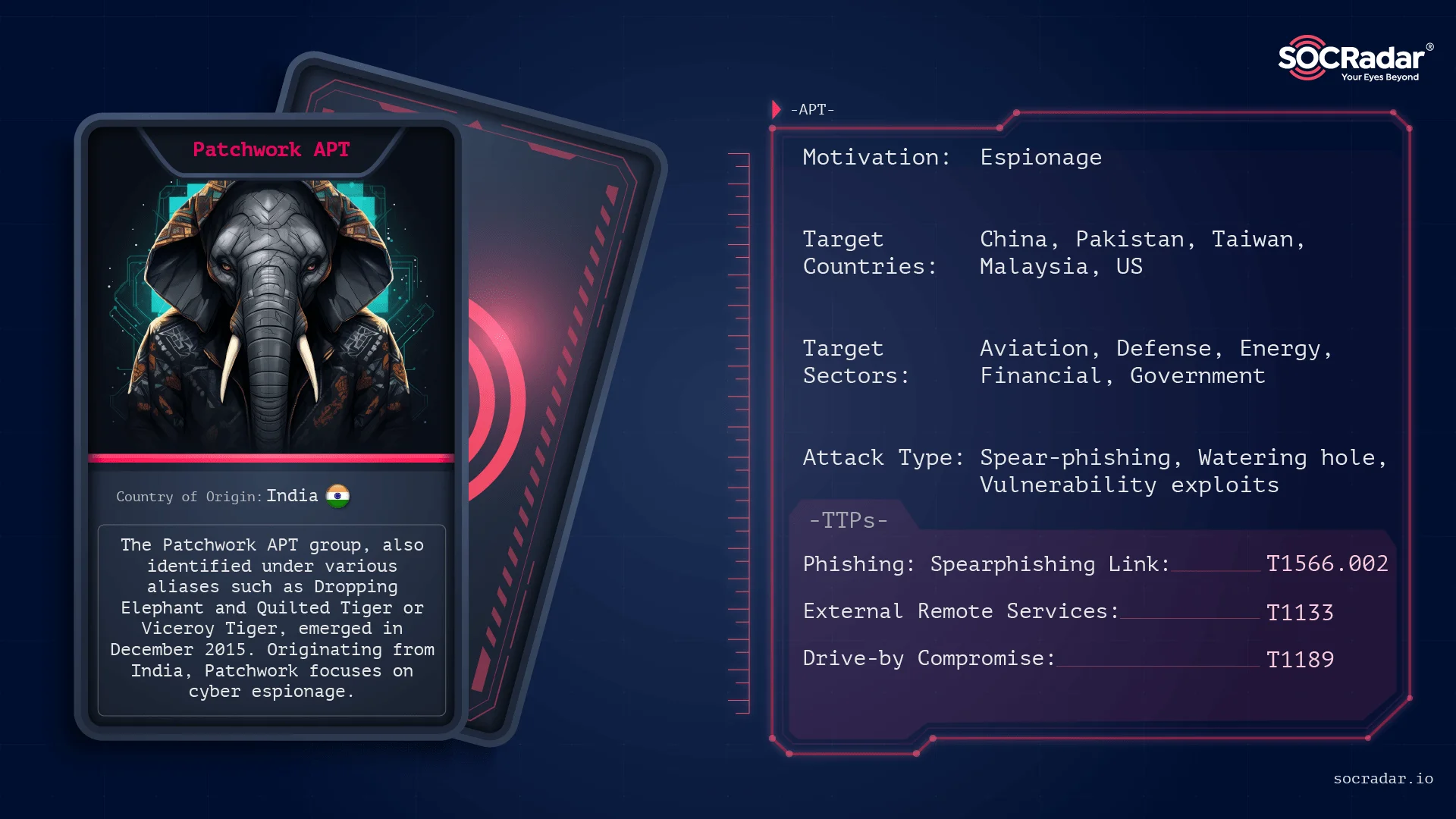
Threat Actor Card, Patchwork APT
The Patchwork APT group, also identified under various aliases such as Dropping Elephant and Quilted Tiger or Viceroy Tiger, emerged in December 2015. Originating from India, Patchwork focuses on cyber espionage, targeting diplomatic and economic sectors with ties to China. Utilizing a blend of spear phishing and watering hole attacks, this group demonstrates a keen interest in intelligence gathering from multiple high-profile international targets. Their sophisticated cyber operations underscore the evolving landscape of global cyber threats and the necessity for vigilant cybersecurity defenses.
Image depicting Patchwork APT, created with Dall-E powered Bing AI Image Creation
Since its first detection in 2015, the Patchwork APT group has evolved from using rudimentary tactics to employing sophisticated cyber espionage strategies. Initially focusing on targets in South and Southeast Asia, the group expanded its operations globally, targeting entities in Europe and North America. Patchwork’s modus operandi includes leveraging spear phishing and watering hole attacks and exploiting malware distribution vulnerabilities.
Patchwork APT focuses on government, defense, diplomatic entities, and academic institutions across South and Southeast Asia, extending to Europe and North America. Their operations have even notably targeted US think tanks and individuals involved in Chinese foreign relations, showcasing a strategic interest in geopolitical dynamics. The most targeted sectors of Patchwork’s cyber intrusions are Aviation, Defense, Energy, Financial, Government, IT, Media, NGOs, Pharmaceutical, and Think Tanks.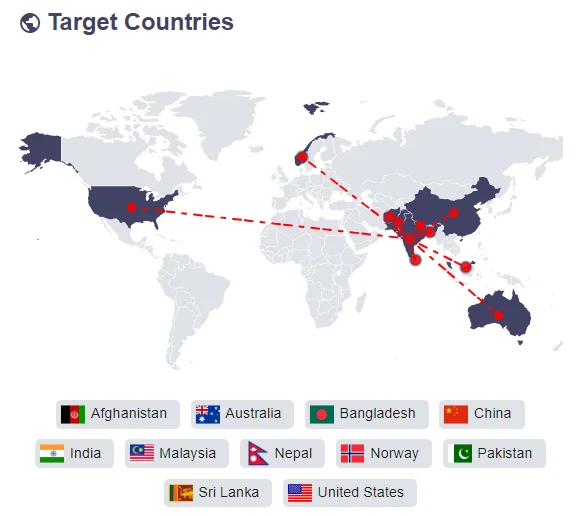
Target Countries of Patchwork APT (SOCRadar)
Therefore, Patchwork APT strategically targets high-profile diplomats and economists engaged in foreign relations with China, utilizing a custom set of cyber tools for espionage. The group’s operations extend to several countries, including Pakistan, Sri-Lanka, Uruguay, Bangladesh, Taiwan, Australia, and the US. 2018 dated campaigns of Patchwork, focusing on think tank groups in the US also drew attention to the group. This pattern of targeting reveals Patchwork’s interest in gathering intelligence on international diplomatic and economic policies and strategies.
Patchwork APT employs spear phishing and watering hole attacks as primary vectors for infiltration. Spear phishing campaigns are meticulously crafted to target specific individuals within the organizations of interest, often leveraging social engineering techniques to deceive recipients into opening malicious attachments or clicking on compromised links.
Watering hole attacks involve compromising legitimate websites frequented by the group’s targets, aiming to exploit vulnerabilities in their web browsers or other software to deliver malware. These methods showcase Patchwork’s adaptability and focus on using human and system vulnerabilities to achieve their objectives.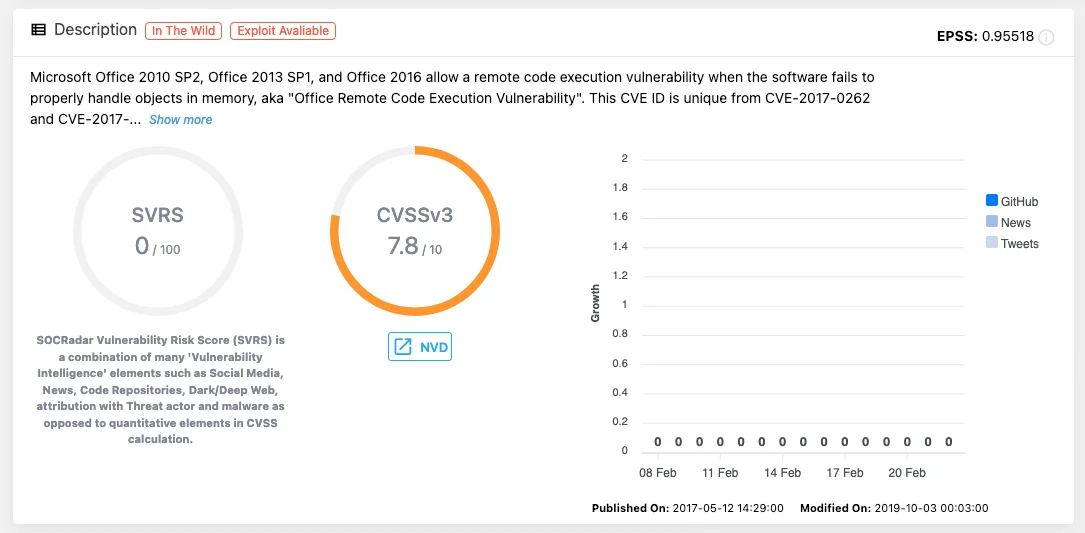
Vulnerability card of CVE-2017-0261 (SOCRadar)
In a cyber attack in 2021, a malicious Microsoft document exploited CVE-2017-0261, a vulnerability enabling remote code execution by improperly handling objects in memory. Analysis of the EPS script within the document revealed sophisticated mechanisms for dropping and executing Patchwork’s payloads, notably a custom keylogger identified by its unique SHA-256 hash.
Recorded CVE Exploits of Patchwork APT
Of course, their arsenal goes way beyond a Microsoft document; Patchwork APT’s arsenal includes malware like the BADNEWS RAT and VajraSpy, an Android-targeted RAT. Their techniques for maintaining access and exfiltrating data demonstrate advanced capabilities in utilizing vulnerabilities, social engineering, and encryption for stealthy operations.
Most recently, ESET researchers uncovered a sophisticated espionage campaign conducted by the Patchwork APT group, involving twelve Android apps bundled with VajraSpy, a remote access trojan (RAT). Six apps were on Google Play, and six were on other platforms. The apps, disguised as messaging tools, targeted users primarily in Pakistan, employing honey-trap romance scams to lure victims into downloading the malware. The campaign, which utilized Firebase Hosting for command and control servers, exfiltrated various data, including contacts and messages. Despite being removed from Google Play, the apps reached over 1,400 installs. Weak operational security exposed 148 compromised devices, mostly in Pakistan and India.
Associated Malware with Patchwork APT in SOCRadar Platform
The Patchwork APT group’s activities result in significant information theft and unauthorized remote access, posing risks to national security and intellectual property. Their targeted cyber espionage campaigns have broader geopolitical implications, influencing international relations and potentially destabilizing regional security dynamics.
In summary, it’s crucial to avoid clicking on unverified links, not to open untrusted email attachments, apply all available patches for vulnerabilities, keep security software updated, and implement rigorous patch management practices. Additionally, enhancing security measures through network and system hardening, alongside code hardening, can significantly reduce the risk of compromise.
To counter the sophisticated cyber espionage tactics employed by the Patchwork APT group further, organizations are also advised to adopt a proactive cybersecurity posture.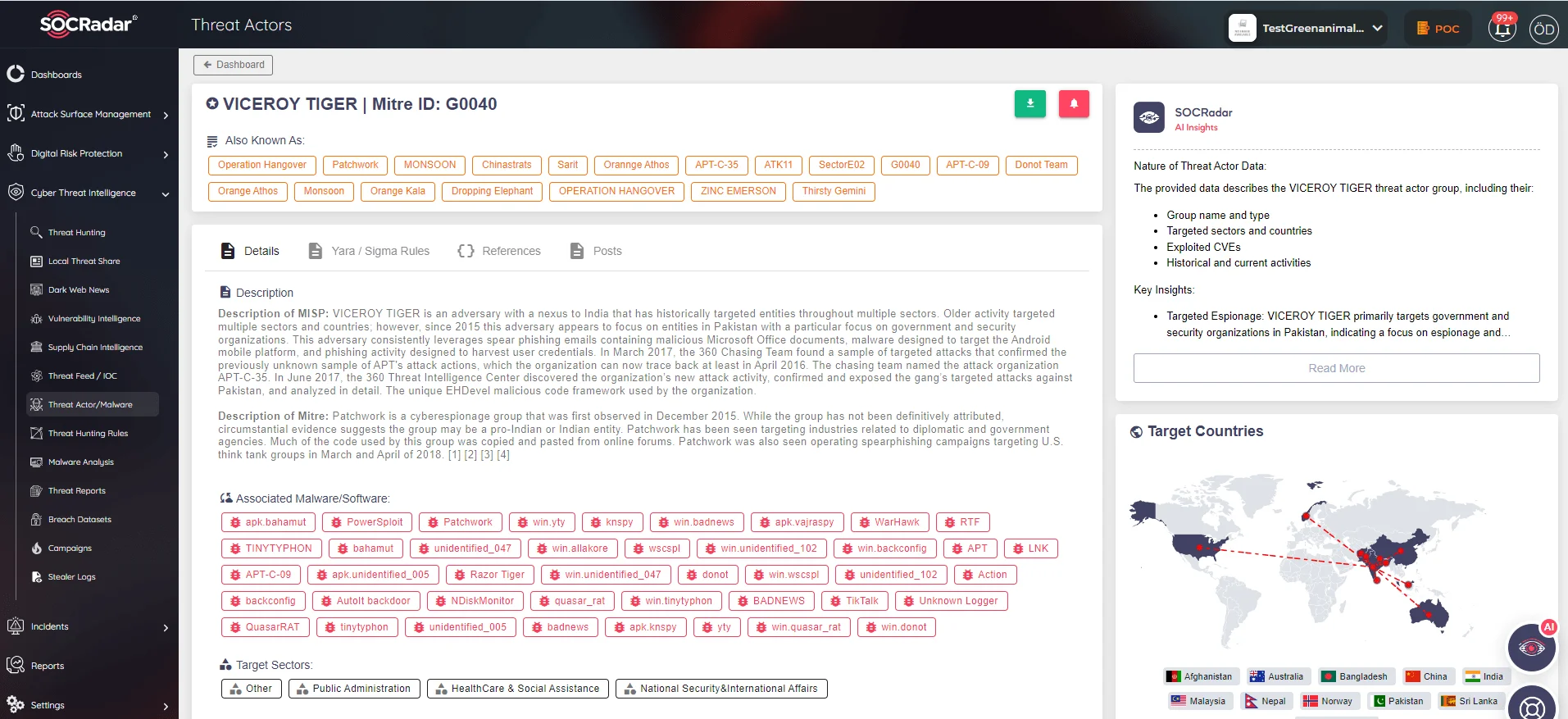
SOCRadar Threat Actor Page
SOCRadar’s Extended Threat Intelligence embodies an innovative advancement from conventional threat intelligence platforms, incorporating sophisticated functionalities that enhance threat detection and visibility significantly. This advanced solution employs robust machine learning technologies to scrutinize extensive volumes of threat data gathered from diverse open sources, social media platforms, and the dark web. Through the utilization of this holistic methodology, SOCRadar’s XTI empowers security teams to promptly discern and rank threats, furnishing them with proactive security measures.
For further IoCs about Patchwork APT, you may check the SOCRadar Platform.
Subscribe to our newsletter and stay updated on the latest insights!
PROTECTION OF PERSONAL DATA COOKIE POLICY FOR THE INTERNET SITE
Protecting your personal data is one of the core principles of our organization, SOCRadar, which operates the internet site (www.socradar.com). This Cookie Usage Policy (“Policy”) explains the types of cookies used and the conditions under which they are used to all website visitors and users.
Cookies are small text files stored on your computer or mobile device by the websites you visit.
Cookies are commonly used to provide you with a personalized experience while using a website, enhance the services offered, and improve your overall browsing experience, contributing to ease of use while navigating a website. If you prefer not to use cookies, you can delete or block them through your browser settings. However, please be aware that this may affect your usage of our website. Unless you change your cookie settings in your browser, we will assume that you accept the use of cookies on this site.
1. WHAT KIND OF DATA IS PROCESSED IN COOKIES?
Cookies on websites collect data related to your browsing and usage preferences on the device you use to visit the site, depending on their type. This data includes information about the pages you access, the services and products you explore, your preferred language choice, and other preferences.
2. WHAT ARE COOKIES AND WHAT ARE THEIR PURPOSES?
Cookies are small text files stored on your device or web server by the websites you visit through your browsers. These small text files, containing your preferred language and other settings, help us remember your preferences on your next visit and assist us in making improvements to our services to enhance your experience on the site. This way, you can have a better and more personalized user experience on your next visit.
The main purposes of using cookies on our Internet Site are as follows:
3. TYPES OF COOKIES USED ON OUR INTERNET SITE 3.1. Session Cookies
Session cookies ensure the smooth operation of the internet site during your visit. They are used for purposes such as ensuring the security and continuity of our sites and your visits. Session cookies are temporary cookies and are deleted when you close your browser; they are not permanent.
3.2. Persistent Cookies
These cookies are used to remember your preferences and are stored on your device through browsers. Persistent cookies remain stored on your device even after you close your browser or restart your computer. These cookies are stored in your browser’s subfolders until deleted from your browser’s settings. Some types of persistent cookies can be used to provide personalized recommendations based on your usage purposes.
With persistent cookies, when you revisit our website with the same device, the website checks if a cookie created by our website exists on your device. If so, it is understood that you have visited the site before, and the content to be presented to you is determined accordingly, offering you a better service.
3.3. Mandatory/Technical Cookies
Mandatory cookies are essential for the proper functioning of the visited internet site. The purpose of these cookies is to provide necessary services by ensuring the operation of the site. For example, they allow access to secure sections of the internet site, use of its features, and navigation.
3.4. Analytical Cookies
These cookies gather information about how the website is used, the frequency and number of visits, and show how visitors navigate to the site. The purpose of using these cookies is to improve the operation of the site, increase its performance, and determine general trend directions. They do not contain data that can identify visitors. For example, they show the number of error messages displayed or the most visited pages.
3.5. Functional Cookies
Functional cookies remember the choices made by visitors within the site and recall them during the next visit. The purpose of these cookies is to provide ease of use to visitors. For example, they prevent the need to re-enter the user’s password on each page visited by the site user.
3.6. Targeting/Advertising Cookies
They measure the effectiveness of advertisements shown to visitors and calculate how many times ads are displayed. The purpose of these cookies is to present personalized advertisements to visitors based on their interests.
Similarly, they determine the specific interests of visitors’ navigation and present appropriate content. For example, they prevent the same advertisement from being shown again to the visitor in a short period.
4. HOW TO MANAGE COOKIE PREFERENCES?
To change your preferences regarding the use of cookies, block or delete cookies, you only need to change your browser settings.
Many browsers offer options to accept or reject cookies, only accept certain types of cookies, or receive notifications from the browser when a website requests to store cookies on your device.
Also, it is possible to delete previously saved cookies from your browser.
If you disable or reject cookies, you may need to manually adjust some preferences, and certain features and services on the website may not work properly as we will not be able to recognize and associate with your account. You can change your browser settings by clicking on the relevant link from the table below.
5. EFFECTIVE DATE OF THE INTERNET SITE PRIVACY POLICY
The Internet Site Privacy Policy is dated The effective date of the Policy will be updated if the entire Policy or specific sections are renewed. The Privacy Policy is published on the Organization’s website (www.socradar.com) and made accessible to relevant individuals upon request.
SOCRadar
Address: 651 N Broad St, Suite 205 Middletown, DE 19709 USA
Phone: +1 (571) 249-4598
Email: [email protected]
Website: www.socradar.com
